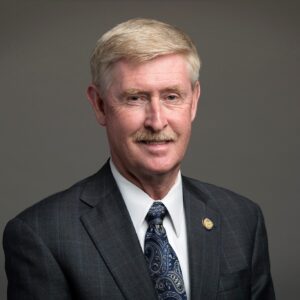April 17, 2023
 Delegate Terry Austin (R-Buchanan) represents the 19th District in the Virginia House of Delegates. Currently serving a fourth term in the House, he chairs the Transportation Committee and serves on those for Appropriations and Rules. In 2018, he was appointed to serve on the Joint Legislative Audit & Review Commission (JLARC), and also chairs the I-81 Advisory Committee.
Delegate Terry Austin (R-Buchanan) represents the 19th District in the Virginia House of Delegates. Currently serving a fourth term in the House, he chairs the Transportation Committee and serves on those for Appropriations and Rules. In 2018, he was appointed to serve on the Joint Legislative Audit & Review Commission (JLARC), and also chairs the I-81 Advisory Committee.
Ralston King, VADA vice president of legislative affairs, asked Del. Austin a few questions about his time as a legislator and insights on transportation in Virginia.
What inspired you to run for office and become a legislator?
I was appointed to the Botetourt County Planning Commission for four years and was subsequently elected to the Board of Supervisors, where I served sixteen. The 19th House District stretches from Alleghany to Bedford. When the opportunity arose in 2013, I decided to run for the seat to represent Botetourt and the region in the House of Delegates.
What are your legislative priorities or issues that you want to focus on for your constituency?
One of my top priorities is economic development. There are several factors that contribute to a business growth environment. Building and maintaining a transportation network system that can accommodate and leverage economic expansion is an essential part of this equation. With the increased importance of time-based delivery, it is imperative that the safe and efficient movement of goods and people remain a top priority.
I am also focused on aligning our education curriculum with local, regional, and statewide workforce needs. The number of vacancies, especially in engineering and healthcare, is not sustainable, and I support the [Governor Glenn Youngkin] Administration’s recent efforts to streamline workforce development.
When people say the “Virginia Way” in terms of Commonwealth’s ancient political ideology…what does this mean to you?
Too often in today’s world, disagreement is used as an opportunity to dismiss the other side as irrelevant or out of touch. The “Virginia Way” acknowledges and embraces disagreement in a cordial manner. The “Virginia Way” is one where we treat each other with respect and dignity, especially when there are differences on an issue. It is understanding that compromise means listening to both sides of an issue, and developing a resolution that moves the Commonwealth forward.
What do you see as the main issues affecting Virginia’s transportation needs over the coming years?
Virginia has tremendous transportation assets with our roads, airports, commuter and commercial rail, and the Port of Virginia. The recent expansion of Amtrak service to Roanoke, the improvements to Long Bridge (an Arlington-Washington area project with improved rail and pedestrian connections), and the dredging and capacity expansion at the Port are good examples of projects that will posture the Commonwealth for future success.
However, transportation funding will continue to be an important issue moving forward, especially for our roads. There are always more needs than dollars available. With this being the case, it is crucial that we properly allocate funds to maintain the quality of our current transportation systems while simultaneously targeting investment that can most effectively unlock economic growth across Virginia.
All options should be put on the table when it comes to addressing Virginia’s future capacity needs. Interstate 81 is a good example. Even with a recently implemented $2 billion funding stream for targeted improvements, more resources need to be directed to I-81 to ensure that the 325-mile corridor functions as intended.
What are the key issues for Virginia’s businesses? What can we do to better support employers and employees in the Commonwealth?
In order to thrive, Virginia’s businesses need regulatory clarity, a friendly tax environment, and an educated workforce. We can improve Virginia’s prospects by aligning our schools with local and regional workforce needs. Keeping our tax rate competitive and maintaining a stable regulatory environment will demonstrate our desire to attract, retain, and grow business in the Commonwealth.
What was the first car or truck you learned to drive?
A Ford F-150.
